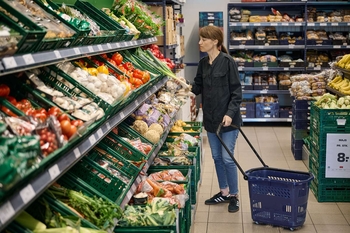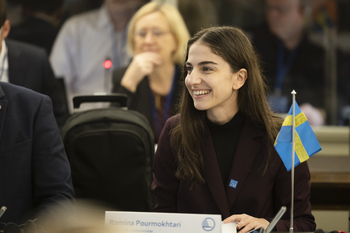New report lists measures to reduce emissions from consumption

Dr. Markus Larsson from KTH Royal Institute of Technology hands over the report Policy Options for Reducing Consumption-Based Emissions to Sweden’s Minister for Climate and the Environment, Romina Pourmokhtari.
The report Policy Options for Reducing Consumption-Based Emissions lists around a hundred potential policy measures that could help reduce consumption-based emissions. Nordic researchers and experts analysed 21 of these measures that they deemed to be the most promising, and ultimately ranked 12 based on their feasibility and potential to reduce emissions.
At the top of the “ranking” are regulatory requirements and standards, i.e. rules and regulations which set limits for emissions, public procurement, and measures that reduce incentives for commuting by car to work.
Fair measures
The experts featured the report point out that it’s easier to adjust policy measures that have already been implemented than to propose new ones. For example, lowering emission thresholds or increasing a tax could be effective ways to achieve results.
At the same time, the researchers argue that the measures must be perceived as fair by the public. Population groups which are disproportionately affected should be compensated.
However, the researchers stress that there is no single miracle solution and recommend that decision-makers work with multiple measures simultaneously. This could involve combining both a carrot and stick approach and ensuring that measures that make life more difficult or costly for people are paired with information that explains the purpose of the policy.
Action is needed
The researchers featured in the report agree that action is needed.
“Although emissions of climate-impacting greenhouse gases in the Nordic countries have decreased over time, this reduction is too slow. And although we know that emissions must fall to near-zero in the coming decades, the current trend indicates that we won’t succeed. Hopefully, this report will accelerate emission reductions,” says one of the researchers behind the report, Dr. Markus Larsson from KTH Royal Institute of Technology.
Larsson presented the report at the Sustainable Living Summit in Stockholm on Tuesday. The conference marked the conclusion of the Nordic Council of Ministers’ Sustainable Living programme, which has been funded by the Nordic Council of Ministers and was co-ordinated by the Nordic research institute Nordregio.
Climate minister receives the report
At the conference, Markus Larsson handed over a copy of the report to Sweden’s Minister for Climate and the Environment, Romina Pourmokhtari.
“The Sustainable Living programme is a statement and a testimony to the power of collective action. It reminds us that sustainable development isn’t just a goal but an ongoing journey that requires every sector of our society to participate in order for us to succeed in achieving our objectives,” said Pourmokhtari.
Sweden holds the presidency of the Nordic Council of Ministers this year and is leading efforts to deliver on the objectives outlined in the vision for the Nordic Region to be the most sustainable and integrated region in the world by 2030.
The conference also say the launch of the Sustainable Living Hub, which gathers all the materials related to the Sustainable Living programme in one place. It includes research results, practical guidelines, educational materials, webinars, and policy recommendations.




